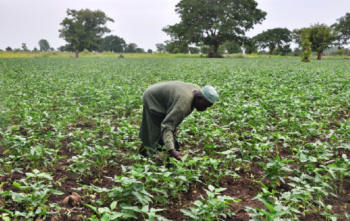The Nigeria Agricultural Quarantine Service (NAQS) has said that it is working towards ensuring that the country is self regulatory in food standards and need not wait for any country to reject its agro produce.
Coordinating Director of the agency, Dr. Vincent Isegbe stated this in Lagos on Wednesday at the opening of a two- day training workshop on Plant Health Inspection and Certification of Vegetables for exporters and farmers.
Isegbe said the training is centred on vegetables because it is one of Nigeria’s most export commodities.
He said because of the sensitive processes involved in the handling of vegetables, there is need to the put in place stringent inspection and certification procedures that will sustain its export especially at a time the government is placing emphasis on non oil export.
“Vegetables are a delicate product and because it is almost ready to eat, it needs more stringent inspection and certification procedures since most times we eat it fresh either as salad. So such ready to eat commodity will need special attention.
“Now that the revenue from oil is falling, we need to go back to our first love which is agriculture. We have been doing well in that area in the 1960,s and early 70’s but in the 80’s, and upwards, there has not been a lot of increase in agricultural produces in exportation. That is why we are emphasising that the process that will enable our commodities to be accepted internationally, we have to put it in place,” he said.
While recalling the EU ban on Nigeria’s beans and how it has affected the economy along the value chain, Isegbe said there is need to avoid future rejection of Nigeria’s agricultural commodities even as he pointed out that the agency is doing its best to revert the situation.
According to him, the EU has promised to reverse the ban if necessary measures are put in place before 2019.
“We have had issues in the past concerning beans where the European Union suspended Nigeria for three years for beans export. That is not good for us because it means that all the farmers who are producing beans can no more export the quantity that they use to export.
“All the traders in between, the warehouse people, the transporters and we who are involve in the inspection and certification, that aspect has been broken down because they cannot generate any revenue along the value chain anymore,” he said.
“The good news is that the EU said if we can put the process in place earlier than 2019, they will reverse their decision. So that is where we are,” he said.
Also speaking, Zonal Coordinator, South West Zone Ikani S.A said in recent times, vegetables from Nigeria are been intercepted by the importing countries especially United States of America due to the menace of White Flies (Bemisia Tabacci).
He said the constant interception is fast becoming an embarrassment to the agency and the nation as whole hence the need to organise the training for farmers and exporters to be more experienced in the process involve in the production and handling of vegetables from the farm down to the port of exit.
“It is as a result of the incidences of White Flies that the Nigeria Agricultural Quarantine Service is organising this training despite the recession and hard times so that all relevant stakeholders are properly guided on the good agricultural practices and by so doing ameliorating the incidence of White Flies and thereby add value to our vegetable and making them acceptable in the international market,” he said.
Training coordinator, Mrs Stella Nonyem said the agency is working to mend fences not only with the EU countries but with the entire international communities.
She added that the training will expose the farmers and inspection officers of the agency to the required local and international standard of food safety.
“With this training for exporter, it means what we have in the market we also be acceptable. We cannot just be exporting for international bodies to enjoy also we in Nigeria should also ensure that what we are eating is safe. That is our aim and objective,” she said.
Copyright 2016 Ships & Ports Ltd. Permission to use quotations from this article is granted subject to appropriate credit given to www.shipsandports.com.ng as the source.
